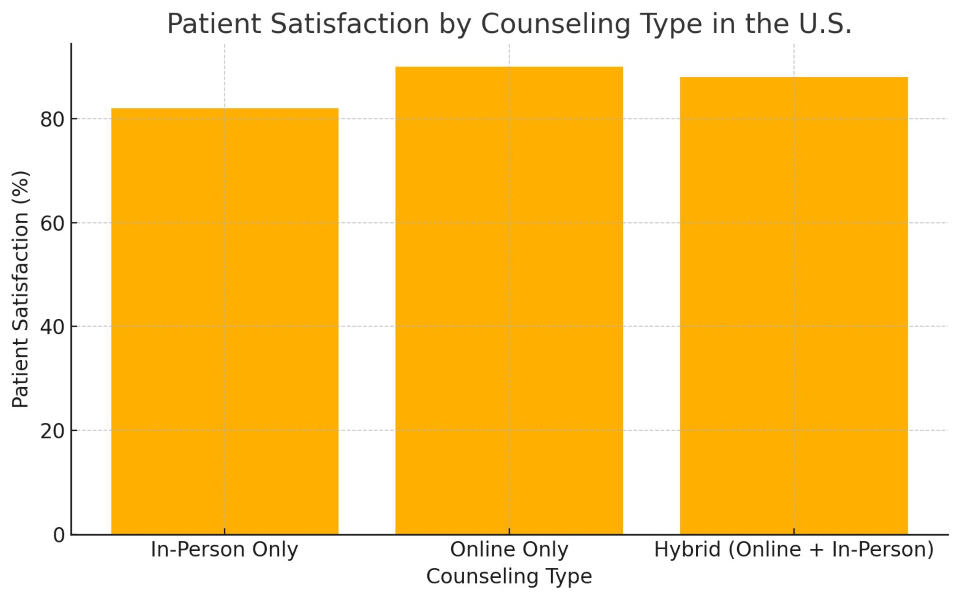Nutrition is no longer just about calorie counting or following food pyramids. It’s a cornerstone of disease prevention and long-term health. But while nearly half of all U.S. adults live with at least one diet-related chronic illness, access to expert nutrition care is still out of reach for many. Enter online nutrition counseling — a flexible, accessible, and often more affordable way to work with a registered dietitian or certified nutritionist.
Let’s break down what online nutrition counseling is, how it works, and why it’s gaining ground in the U.S. health system.
What is Online Nutrition Counseling?
Online nutrition counseling is the process of receiving personalized dietary advice from a qualified nutrition professional through virtual methods. These can include:
-
Video conferencing (Zoom, HIPAA-compliant platforms like Healthie or Practice Better)
-
Phone consultations
-
App-based or chat-based interactions
-
Email and asynchronous messaging
Instead of sitting in a clinical office, you talk to a licensed professional from your home, car, or wherever’s comfortable. This format opens the door to regular, tailored guidance for anyone with a smartphone or computer.
How It Works
Most online counseling follows a structure similar to in-person care, but with digital flexibility:
-
Initial Intake
-
Your medical history, eating habits, medications, and lifestyle are reviewed.
-
Labs and biometric data may be integrated, especially for chronic condition management.
-
Personalized Nutrition Plan
-
A dietitian will create a plan based on your needs — weight loss, blood sugar control, GI support, or performance nutrition.
-
This often includes meal ideas, shopping tips, behavior strategies, and supplement guidance.
-
Ongoing Follow-Up
-
Digital Support Tools
-
Many programs include app integrations for food logging, goal tracking, reminders, and chat-based Q&A.
Who Provides Online Nutrition Counseling?
In the U.S., reputable counseling services are typically offered by:
-
Registered Dietitian Nutritionists (RDNs): Licensed experts who meet national credentialing standards, including clinical training and board exams.
-
Nutritionists: This term is less regulated. Some are well-trained; others are not. Always check credentials.
-
Health Coaches and Certified Nutrition Coaches: These professionals may provide general guidance but not medical nutrition therapy.
Why It’s Growing in the U.S. Healthcare System
With high rates of obesity, diabetes, hypertension, and cardiovascular disease, the U.S. needs scalable solutions for nutrition education. But traditional models haven’t worked well — either due to high costs, limited insurance coverage, or too few dietitians per capita.
Online counseling addresses these gaps. Here's how:
1. Accessibility
According to the CDC, 1 in 5 Americans live in rural areas. In these regions, the nearest dietitian might be hours away. Online counseling eliminates travel and brings care to underserved communities.
It also supports people with disabilities, parents with tight schedules, or anyone who finds in-office visits inconvenient.
2. Affordability
Healthcare costs in the U.S. are a barrier — and nutrition counseling is no exception. In-person sessions can run $100–$150 or more per visit, often not covered by insurance unless for a very specific condition (like diabetes or kidney disease under Medicare Part B).
Online options are often less expensive, especially when bundled into subscription packages or employer wellness programs.
3. High Satisfaction and Engagement
Studies show virtual visits have high patient satisfaction and lower no-show rates. Patients often feel more comfortable opening up from the privacy of their homes. With flexible scheduling and instant messaging, support feels more accessible and personal.
Here’s a snapshot of how different counseling formats compare:
And here’s a visual breakdown of satisfaction levels:

Where Does It Fit in the U.S. Insurance Landscape?
This is where things get interesting. Until recently, few insurers covered preventive nutrition care unless tied to a diagnosis like diabetes, chronic kidney disease, or obesity. But the expansion of telehealth policies during COVID-19 changed that.
Some key updates:
-
Medicare: Covers MNT for diabetes and CKD, with virtual delivery now widely accepted.
-
Private Insurance: More states now require coverage for telehealth services at parity with in-person care.
-
Employer Wellness Plans: Many companies offer digital nutrition counseling as part of preventive health benefits.
As of 2025, more than 60% of large employers in the U.S. include some form of digital nutrition support in their wellness programs — often covering it fully.
Top Online Nutrition Counseling Platforms in the U.S.
Here are a few major players:
Who Should Use Online Nutrition Counseling?
Anyone interested in improving their health through food can benefit. But it’s especially valuable for:
-
People with chronic diseases (diabetes, high blood pressure, IBS, high cholesterol)
-
Adults with weight management goals
-
Individuals seeking plant-based or allergy-friendly diets
-
Women during pregnancy or menopause
-
Athletes and fitness enthusiasts
-
Patients undergoing bariatric surgery
-
Those recovering from disordered eating
It’s also ideal for preventative care — like reducing your risk of heart disease or improving gut health before issues become serious.
Limitations to Consider
Online nutrition counseling is powerful, but not perfect:
-
Not suitable for emergencies: Severe malnutrition, eating disorders requiring hospitalization, or acute illness needs in-person care.
-
Licensing issues: Many states restrict dietitians from providing MNT unless licensed in that state. Providers must navigate a patchwork of laws.
-
Tech hurdles: Older adults or those without stable internet access may struggle.
Still, these are being addressed through broader licensure compacts and tech-friendly platforms designed for all ages.
A Healthier, More Convenient Future
Online nutrition counseling is changing how people in the U.S. get nutrition support. It reduces cost, removes barriers, and delivers expert care straight to your screen. While it’s not a one-size-fits-all solution, it’s a vital tool in addressing chronic disease and improving public health.
Whether you’re a busy parent, managing diabetes, or just trying to build healthier habits — virtual support might be the most effective (and accessible) way forward.